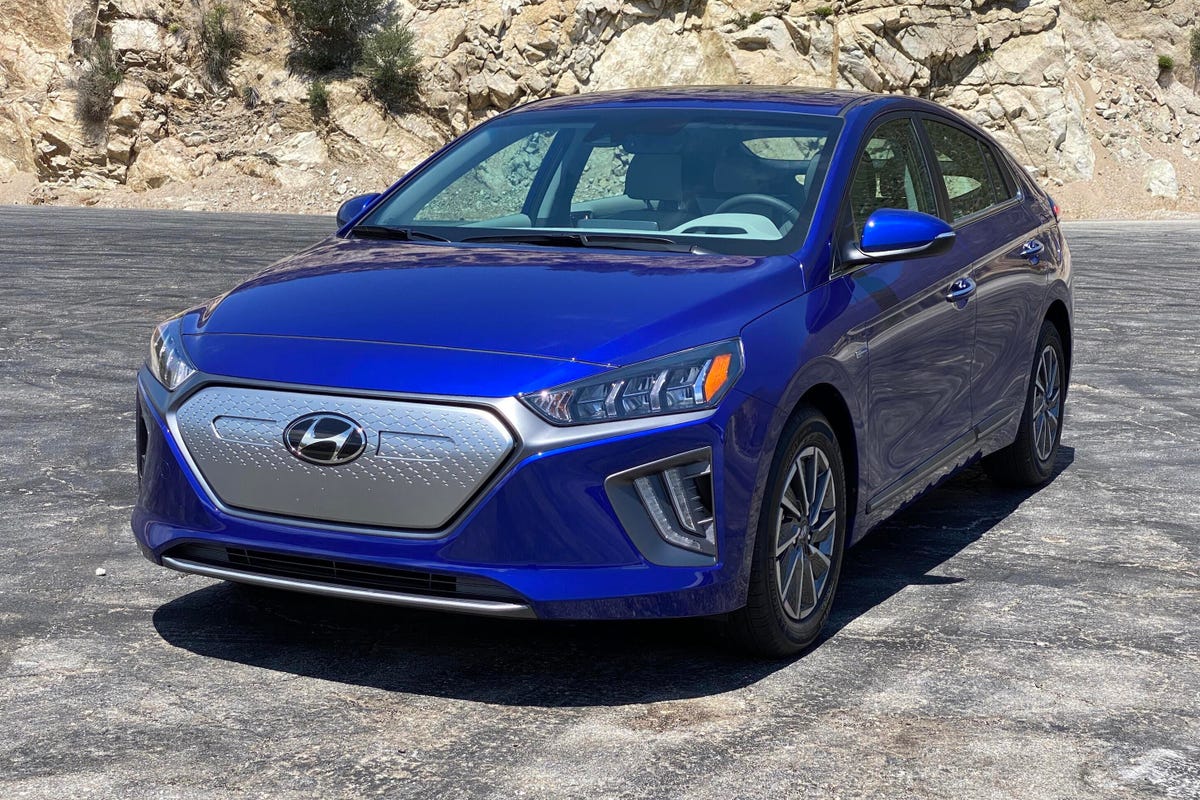 Why You Can Trust CNET
Why You Can Trust CNET 2020 Hyundai Ioniq Electric review: A little EV that offers a lot for your money
The Ioniq might not be the first car that comes to mind when you think of compact EVs, but there are a lot of reasons to consider Hyundai's affordable electric.
The Ioniq received updated front-end styling for 2020.
In a world where EVs are able to hit 300 miles per charge, and where sub-5-second 0-to-60-mph times are normal, Hyundai's Ioniq Electric might seem like a bit of an also-ran. But despite its modest performance and general lack of flash, it's a car that's worth considering -- especially as a first EV.
Like
- Usable 170-mile range.
- DC fast-charging standard.
- Good infotainment.
- Lots of cargo space.
Don't like
- Looks a little boring.
- Limited trim is a less attractive value proposition.
With the Ioniq Electric, what you see is what you get: An unassuming battery-electric hatchback from a well-known and respected manufacturer. It offers little in the way of virtue signaling for those who want the world to know they bought an EV, but with 170 miles of range and a sub-$35,000 price tag (including destination), it presents a fairly painless and accessible path to EV ownership for those who care more about doing good than looking good.
The little electric Hyundai is powered by a single permanent-magnet electric motor that offers up 134 horsepower and 218 pound-feet of torque. Not earth-shaking by any means, but totally adequate for daily use. That motor drives the front wheels via a single-speed reduction gear -- pretty standard fare for most EVs.
The car stores its juice in a 38.3-kilowatt-hour lithium-ion battery pack, which is good for a claimed range of 170 miles. That puts the Hyundai behind similarly sized rivals like the Chevrolet Bolt (259 miles) and Nissan Leaf Plus (226 miles), but 170 miles is more than enough range for most people in most EV use cases. Thankfully, the Ioniq Electric accepts DC fast-charging and will go from 0% to an 80% state of charge in around 45 minutes.
The Ioniq is a perfectly nice driver, but dynamically speaking, it's nothing to write home about. The ride isn't punishing or even unpleasant until you get to really nasty pavement. But aside from this suspension that feels like it could do with a bit more sophistication, the Ioniq is all totally fine.
The Ioniq offers three levels of adjustable regenerative braking, which is awesome. I'm firmly in the "all the regen, all the time" school of thought, and the Hyundai allows for one-pedal driving around town, though it's not so strong that it'll bring the Ioniq to a stop. What I don't love is that I have to reset the regen level every time I get in the car, which I can see becoming really annoying if I owned one of these.
Hyundai's standard driver-assistance systems are numerous and nicely executed. Features such as adaptive cruise control with stop-and-go functionality, lane-keeping assist and forward-collision avoidance with pedestrian detection are standard equipment across the board. If you decide to step up to the more expensive Limited trim seen here, you also get features like blind-spot warning and Hyundai's Highway Driving Assistant, which pairs adaptive cruise control and lane-keeping assist to keep your vehicle in the center of a lane and at a safe distance from other vehicles.
Moving inside, Apple CarPlay and Android Auto are standard, and if you don't want to use those, Hyundai's proprietary BlueLink system is snappy, legible and generally pleasant to use. I'm a fan. The base Ioniq Electric SE comes with a 8-inch touchscreen multimedia system, but stepping up to the Limited gets you a larger, 10.2-inch screen, and includes navigation.
The interior looks a little drab, but it's comfortable and quiet.
The Ioniq's interior might seem a little cheap with its sea of light-gray plastic, but it all feels better than it looks. A lot of the surfaces are topped with soft-touch materials, and there's not a single squeak or rattle to speak of -- something that's especially important in a car where there's no powertrain noise to cover up smaller imperfections. Hyundai lets you turn off the passenger-side air vents to reduce your climate control drain, which is a near feature to have when the weather is mild.
Being a hatchback, the Ioniq Electric offers plenty of room for cargo: 23 cubic-feet with the rear seats up. Since all of the powertrain mechanicals are packaged under the hood, there's no frunk here like on a Model 3 , but the Ioniq doesn't really need it. The hatchback is plenty spacious, itself offering more room than what you get in the Bolt or even a Tesla Model 3.
Overall, the Ioniq is a perfectly competent little EV, and affordably priced, too -- $34,020, including $975 for destination. Even in its most expensive form, the 2020 Ioniq Electric Limited retails for $39,590 including destination, and that's before you factor in any government or local incentives.
That puts the Ioniq right alongside competitors like the Bolt and Leaf. Chevy's EV starts at $37,495 including $875 for destination, though the price increases rather quickly once you start adding options. Of course, that bigger investment gets you a lot more electric range. As for the Leaf, it starts at $32,525 including $925 for destination, but that's for the base S model with the 40-kWh battery pack, which is rated at 149 miles of range, but doesn't come standard with fast-charging capability. Stepping up to the Leaf Plus costs $39,125, which gets you the 226-mile range and standard 100kW fast-charging, but Nissan's ProPilot Assist -- which is similar to Hyundai's Highway Driving Assistant -- is still optional.
Go for a base Ioniq and you'll get a lot of car for the money.
Then, of course, there's the Tesla Model 3, which starts at $37,990 in its cheapest Standard Range Plus configuration. You're getting much better range with this Tesla -- 250 miles, to be exact -- but once you choose a color other than white, different wheels or any options, you're well into the mid-to-high-$40,000 region.
Personally, I'd stick with the cheaper Ioniq Electric SE, which gets you the same range and charging capability, but takes away the larger infotainment screen, not-super-luxurious leather seating and the Highway Driving Assistant -- things I could totally live without. Factor in the available incentives, and you could get an Ioniq Electric SE into the mid/high-$20,000s. The only EV that undercuts that is the new Mini Cooper SE, but it only offers 110 miles of range.
All things considered, the 2020 Ioniq Electric offers a lot of car for the money, not to mention Hyundai's excellent 10-year/100,000-mile powertrain warranty. It's a really attractive option for first-time EV buyers.



